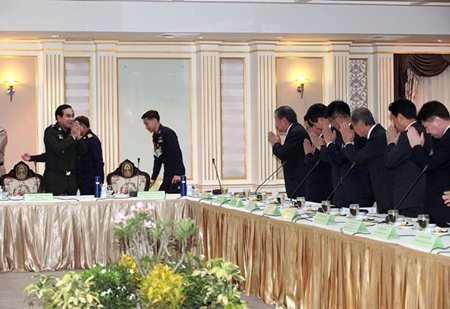South Korean businesses have expressed confidence to continue investing in Thailand following a meeting with National Council for Peace and Order (NCPO) chief General Prayuth Chan-Ocha.
President of the Korean-Thai Chamber of Commerce Lee Man Jae said that after the NCPO has taken over, Thailand has become more politically stable, which has boosted confidence of South Korean businessmen. He also expressed support for the NCPO’s emphasis on implementing measures with transparency as it will push Thailand towards the right direction.

He pointed out that Thailand is the gateway to the ASEAN Economic Community (AEC) and continues to be an attractive destination for foreign investors. The Chamber of Commerce president forecasted that Thailand’s economy during the second half of the year will improve. Should the country be able to maintain its political stability, economic growth next year will be higher than those of previous years.
The statement came after NCPO chief Gen Prayuth Chan-ocha met with a business delegation from South Korea to clarify the situation in Thailand and assured them that all trade and investment deals with foreign investors would be transparent and kept under scrutiny.
A group of South Korean business operators paid a courtesy call on Gen Prayuth in a bid to discuss the NCPO’s policy on trade and investment. Gen Prayuth affirmed that trade and investment relations between Thailand and South Korea would be as strong as ever. He also stressed the necessity for the NCPO to take over the administrative power in Thailand, saying the previous government was unable to exercise such power for the benefit of the country due to its interim status at the time.
The NCPO Chief added that Thai troops were deployed in the Korean War and a monument had been built in Chon Buri province to commemorate the event, signifying the long-standing alliance between the two nations.
South Korea is Thailand’s 10th largest trading partner. Both countries have been aiming to push the value of bilateral trade to $30 billion within 2016. Currently, trade between the two countries is worth around $14 billion.




